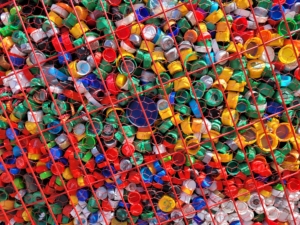Addressing Plastic Pollution in the Global South Through Art
 The creative economy encompasses a wide range of goods and services created through imagination and intellect, such as novels, art installations and theatrical performances. It is a significant global industry, generating more than $2,250 billion in annual revenues and employing more than 50 million people worldwide. However, these figures may underestimate the sector’s true impact, especially in the digital domain. These art forms not only inspire but also have a meaningful impact. For example, artists around the world are using their creativity to address plastic pollution in the Global South.
The creative economy encompasses a wide range of goods and services created through imagination and intellect, such as novels, art installations and theatrical performances. It is a significant global industry, generating more than $2,250 billion in annual revenues and employing more than 50 million people worldwide. However, these figures may underestimate the sector’s true impact, especially in the digital domain. These art forms not only inspire but also have a meaningful impact. For example, artists around the world are using their creativity to address plastic pollution in the Global South.
Global Plastic Pollution
Unlike noise, chemical and light pollution, the effect of human overconsumption is impossible to ignore because of its visual nature. The majority of plastic packaging ever produced still accumulates in landfills and bodies of water, with only 9% being recycled. In the past decade, This overabundance of plastic has reached a tipping point, disproportionately affecting the world’s poor. As a result, 218 million people are at a higher risk of flooding due to blocked waterways caused by plastic waste. This equates to 3% of the global population, surpassing the populations of the U.K., Germany and France combined.
Mismanaged plastic waste does not only degrade flood mitigation efforts; the blockage of drainage systems contributes to a higher prevalence of water-borne diseases in slums, coastal communities and small-island developing states.
Artists worldwide are drawing attention to the pressing issue of plastic pollution through their creative expressions, amplifying underrepresented opinions, showcasing skilled craftsmanship and supporting local economies.
Creative Criticism in the Democratic Republic of Congo
Congolese performance artist Junior Mungongu has gained international recognition for his bold statements at a recent exhibition during the KinAct Festival in Kinshasa. The capital of the Democratic Republic of Congo continues to grapple with plastic waste management. The urban art display, established in 2015, aims to encourage social criticism and alternative forms of protest. Last year, Mungongu wore a full-body suit made entirely of plastic bottles and caps, urging passersby to twist the tops back on.
A Jamaican Perspective on the Impacts of Single-Use Plastic
In Jamaica, Travis Hunter has made a name for himself for making masterpieces from recycled plastic. Displayed in his front yard, Travis Hunter’s work has gained considerable notoriety in Gregory Park, Portmore. Hunter founded Travis Arts Jamaica in 2018, promoting an environmentally sustainable creative venture. A sculptor and painter by profession, he has managed to earn an income from building tables, benches and flower pots made out of plastic bottles, newspaper and styrofoam.
Kenyan Artistry for Environmental Stewardship
Vivian Oluoch founded Avianna Eco Arts and Decor Foundation to fight plastic pollution and empower female artists in Homa Bay. The home decor and handbag storefront uses old wine bottles and plastic trash to create marketable art. The effort is largely backed by women from the slums surrounding Shauri Yako Estate, who have profited from plastic crafts since 2020.
Vivian Oluoch established the Avianna Eco Arts and Decor Foundation in Homa Bay, Kenya, to combat plastic pollution and empower female artists. Its home decor and handbag storefront utilizes old wine bottles and plastic trash to create marketable art. This effort is primarily supported by women from the slums surrounding Shauri Yako Estate, who have been profiting from plastic crafts since 2020.
Catadores Clean Up Belo Horizonte Streets for a Cause
ASMARE is a collective of garbage collectors in Brazil that has established livelihoods for the homeless by selling art made of discarded plastics, tires and cardboard boxes for 33 years. It is comprised of almost 200 official employees. The group sells chairs, chandeliers and decorative figurines fashioned of what most would consider trash that litters nearby community spaces.
In the face of adversity, some of the world’s most marginalized populations have demonstrated remarkable resourcefulness. Plastic pollution in the Global South presents a significant untapped source of revenue, fostering sustainability and stimulating the creative economy.
– Avery Pearson
Photo: Unsplash
